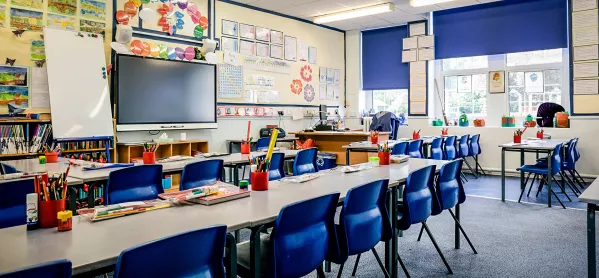Local authorities should be given the power to╠²manage an academyŌĆÖs closure or reduce the maximum number of pupils it admits to cope with falling primary school rolls, ministers have been told.╠²
And the government has been warned that falling rolls at primary schools will ŌĆ£put further pressureŌĆØ on school budgets because it will lead to╠²smaller government funding allocations.
The call on ministers to honour commitments made in the╠² for local authorities to hold powers to direct trusts to admit children comes from London Councils, which represents the capitalŌĆÖs 32 local authorities.
London Councils has╠²published new analysis╠²revealing that London boroughs are expected to see an average 7.3 per cent decrease in Reception pupil numbers over the next three years, with LondonŌĆÖs total Reception numbers predicted to fall from 96,424 to 89,121 by 2026-27.
London Councils said that this would be a drop roughly equivalent to 243 classes.
It added that the fall ŌĆ£reflects the decline in the birth rate since 2012 and changes in migration patterns in LondonŌĆØ, triggered in part by Brexit and the pandemic.
The impact of falling pupil numbers
The fall is likely to have a knock-on effect on Year 7 places in secondary schools across London, with forecast demand predicted to fall by╠²5 per cent between 2022-23 and 2026-27, according to London Councils - ŌĆ£a slower rate of decline than at the primary levelŌĆØ.
London Councils is urging the government to give local authorities the power to manage an academyŌĆÖs reduction of pupil admission numbers (PAN) or closure, where there is clear evidence locally of a significant drop in demand and a need to act to ensure that a school remains financially viable.
The organisation╠²said the government needs to ŌĆ£give local authorities the responsibility for in-year admissions and powers to direct all schools to accept local children on to their roll, where appropriateŌĆØ.
Its report also points out that high numbers of surplus places in primary schools mean there is now an ŌĆ£opportunity...to identify ways to make them more inclusive to children with special educational needs and disabilities (SEND)ŌĆØ.
ŌĆ£This will require a collective effort from local authorities, schools and the Department for Education, particularly to ensure that schools are appropriately funded to be able to deliver the support required to meet the needs of children with SEND,ŌĆØ it says.
The governmentŌĆÖs SEND Green Paper also included a proposal to allow councils to direct multi-academy trusts to admit pupils with SEND.
Last year Will Quince, when he was childrenŌĆÖs minister, told╠²Tes╠²that giving local councils the power to direct schools and academy trusts to take on pupils with SEND could be ŌĆ£game changingŌĆØ for children.
Referring to the falling pupil population, London Councils also said╠²it is ŌĆ£important that the government recognises this pressure in the system and funds schools appropriately and in line with inflation, so that they are more financially resilient and are better able to manage a decrease in demand or a surge in in-year admissionsŌĆØ.
Its report also recommends that the DfE should take a ŌĆ£more proactive role in withdrawing applicationsŌĆØ for primary free school developments that were delayed ŌĆ£and are still in the pipeline to open, despite demand patterns shifting dramatically in local areasŌĆØ.





